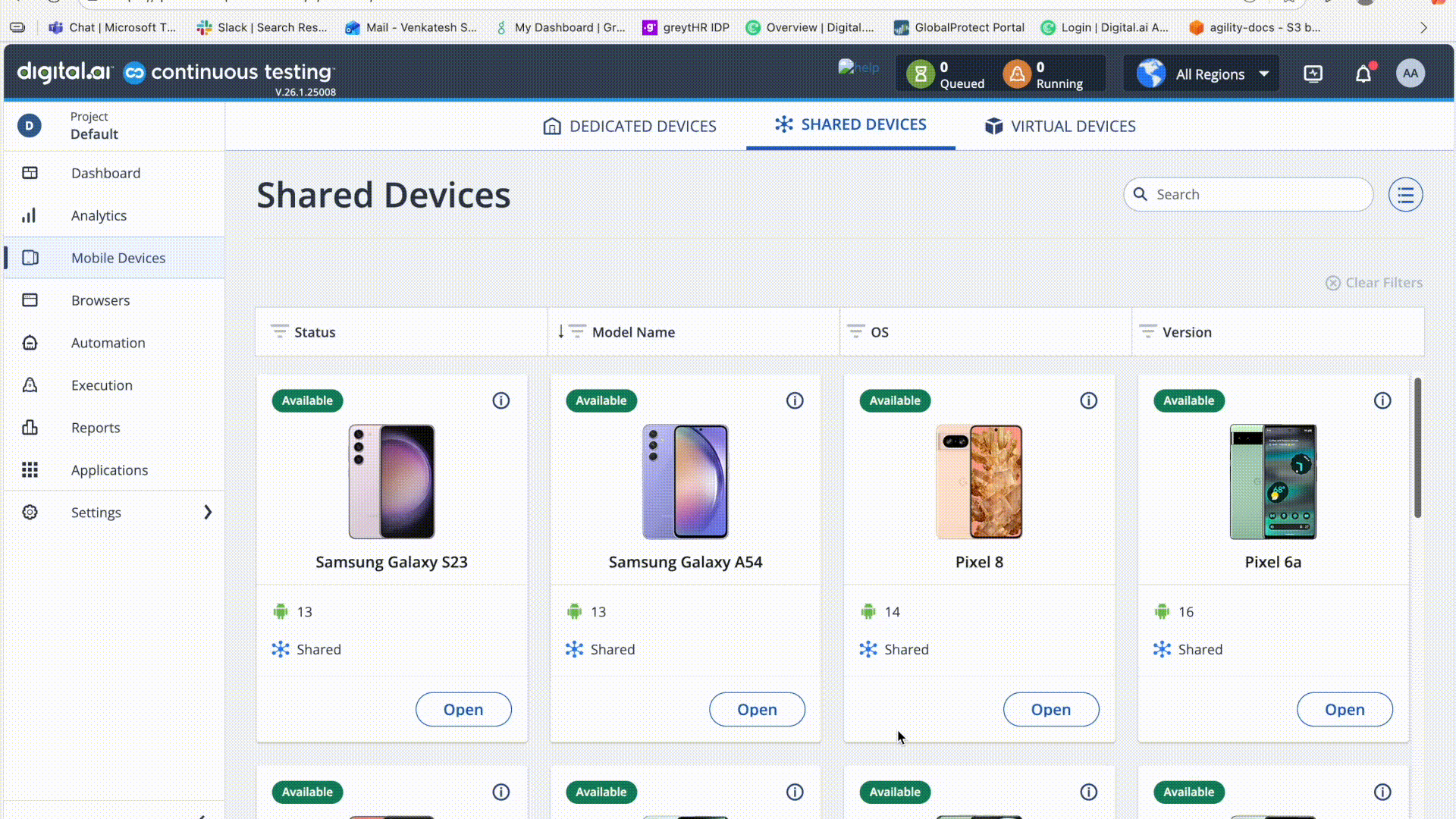Shared Devices
Prerequisites
Only supported for SaaS customers. To learn more about this offering, reach out to our Support Team.
Description
Shared Devices offer access to a pool of iOS and Android mobile devices, available directly within your dedicated environment.
Shared devices work only with Appium Server projects. Ensure your automation project is configured to use Appium Server before attempting to run tests on shared devices.
With a single, unified interface, you can seamlessly switch between Dedicated and Shared Devices. This flexibility makes it easier to expand your testing coverage by accessing a large pool of shared devices on a first-come, first-served basis.

A key feature of this offering is its seamless integration with your network. When you use a shared device, it automatically connects to the same Wi-Fi network as your dedicated devices. This ensures you can easily test lower-level environments and non-production instances.
Test with confidence, knowing that our advanced cleanup mechanism ensures no left-over data remains on the shared devices after your testing is complete.
Key Benefits
Adding Shared Devices to your existing Dedicated Devices pool can solve several challenges:
-
Expanded Device Matrix: You may not have all the devices you need for testing in your dedicated pool. The diverse range of devices available in the Shared Devices pool helps mitigate coverage gaps. If you suddenly need to test on an older device model or one that’s unavailable in your dedicated pool, simply switch to the Shared Devices tab to find the exact device combination you need.
-
Device Availability During Peak Hours: The Dedicated Devices pool might be crowded during peak testing hours, especially when other teams are using the devices. In such cases, you can quickly switch to the Shared Devices tab and continue testing without worrying about device availability.
-
Unified Experience: Both Dedicated Devices and Shared Devices are seamlessly integrated into a single user interface, providing a streamlined and flexible experience for all your testing needs.
Here are a few scenarios where Shared Devices can make a significant difference:
-
Scenario 1: A release is approaching, and you need to test on the latest device models available in the market that you don't currently have in your Dedicated Devices offering.
-
Scenario 2: A defect was found in production on a specific device model, but you don't have that exact model in your Dedicated Devices pool. You can easily replicate the issue by switching to the Shared Devices tab.
By instantly switching to Shared Devices, you can quickly tackle challenges head on.
Explore Shared Devices
In this section, we’ll explore all the capabilities with Shared Devices.
-
Getting Started with Shared Devices - Discover how to leverage Shared Devices to expand your device coverage
-
Functionality Overview for Shared Devices - Explore the various features available with Shared Devices
-
Running Automated Tests on Shared Devices - Understand the requirements for running automated tests on Shared Devices
-
Cleanup Mechanism Explained - Discover how we ensure a secure and clean environment on Shared Devices
-
Limitations on Shared Devices - Understand the limitations of Shared Devices
-
Frequently Asked Questions - Find answers to common questions raised for Shared Devices
Supported Devices & Versions
| iOS | Android | |
|---|---|---|
| Versions | 15-26.1* | 7-16* |
| Models | iPhones (iPhone 7 and above) & iPads (iPadOS 15 above) | Samsung, Pixel, OnePlus, Huawei, Oppo, Xiaomi |
- iOS 17.0-17.3 are excluded.
- Android 16 Version is currently official and supported for Pixel, Xiaomi, Samsung devices only.
Help and Feedback
Help
If you didn’t find what you were looking for in our documentation, reach out to our Support Team for assistance.
Support & Maintenance
To learn about our support model, see Support and Maintenance
Feedback
If there are product ideas you’d like to submit for us to consider, head to our Ideas Space.